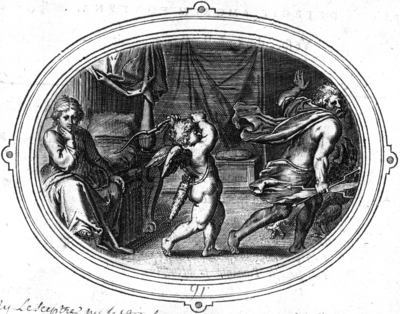Otto Vaenius, Amorum emblemata (1608)
Table of contents ↑Nec regna socium ferre, nec tædæ sinunt [91]

Translations
 |
Seneca, Agamemno 259.
De troon laat zich niet delen, noch een echtgenoot. |
 |
Seneca, Agamemno 259.
Nor throne nor bed can brook a partnership. [tr. F.J. Miller, Loeb, p. 25]. |
Sources and parallels
- Contrast the exclusiveness of secular love with the willingness to share
divine love in:
Crescit in immensum [17] (in: Otto Vaenius, Amoris divini emblemata (1615)
(in: Otto Vaenius, Amoris divini emblemata (1615) )
[Compare
)
[Compare ]
]
and [Opener] (in: Otto Vaenius, Amoris divini emblemata (1615)
(in: Otto Vaenius, Amoris divini emblemata (1615) )
[Compare
)
[Compare ]
.
]
. - Ayres, Emblemata amatoria
 , embl. 25
, embl. 25 -
Parallel for the pictura (mirrored, less detailed) and for some mottoes (the English, Italian, Dutch, French ones;
though not exactly): Un Cupidon frappant une personne qui le vient interrompre étant prés d’une Belle
 (in: Daniel de la Feuille, Devises et emblemes (1691)
(in: Daniel de la Feuille, Devises et emblemes (1691) )
[Compare
)
[Compare ]
]
References, across this site, to this page:
- Un Cupidon frappant une personne qui le vient interrompre étant prés d’une Belle
 (in: Daniel de la Feuille, Devises et emblemes (1691)
(in: Daniel de la Feuille, Devises et emblemes (1691) )
)
- [Opener]
 (in: Otto Vaenius, Amoris divini emblemata (1615)
(in: Otto Vaenius, Amoris divini emblemata (1615) )
)

